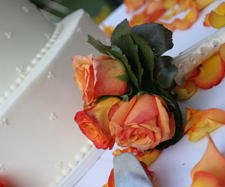Helpful hints when planning a wedding
Getting married can be one of the most joyous and anticipated events in life. With so much focus on the "big day," it's important not to let the stress of planning, budgeting and family expectations keep you from enjoying your special event.

Considering the emotions involved, coupled with the average cost of a wedding—in excess of $20,000—there are sure to be jitters for both the bride and groom.
Here are some tips to steer you in the right direction:
Getting started
Imagine your perfect wedding, then decide what's realistic and what isn't. Here are some issues to think about:
-
Put together a guest list. Try having an A-list (invitees who are a must) and a B-list (those who may be invited depending on size limitations).
-
Select your wedding party.
-
Select your date. Pick your preferred date but choose a backup date as well, in case locations are booked.
-
Choose ceremony and reception locations, again with a backup choice.
-
Prepare a budget.
-
Go ahead and buy or book the basics early. Staying within your budget, you can proceed with the items that are a must, such as flowers, a caterer, a cake and attire for the couple.
-
Set up a gift registry. This is a great way to ensure you get gifts you need, and can make gift-buying more convenient for your guests as well.
Budget tips
Few people can afford to have everything they want on their wedding day, but that doesn’t mean you have to feel like you are sacrificing either. Here are some tips to stay on track financially and still have a day you can be proud of:
-
Schedule your wedding during the "off-season." This typically means January, February, March or November. This makes almost everything more affordable.
-
Plan the ceremony and reception for earlier in the day rather than during the peak times of dinner hour and evening.
-
Find a low-cost location. Public parks and buildings can be just as beautiful as any banquet hall. Or for some added personal meaning, consider a wedding in a family home.
-
Select a gown from the eveningwear section of a department store or a bridal discounter. Always watch for sell-offs and specials at bridal stores or shows.
-
Decorate strategically. Select a location that needs little or no embellishment such as a garden in bloom, a beach, an historic building or church.
-
Select flowers that are locally available and in season.
-
Use the talents of family and friends for help with decorating, flowers, music, etc.
-
Consider a more intimate wedding. These can be more meaningful and less stressful, and cutting the guest list down ensures savings.
Hiring suppliers
“Buyer beware” is a great policy at any time, but perhaps never more so than when you are planning a pricey and emotion-filled event.
-
Research the track records of suppliers you are considering. Start with recommendations from friends but also check business watch groups or organizations and ask for references.
-
Try to get more than three estimates for each service and compare prices.
-
Carefully read all contracts before you sign them.
-
Get receipts of all your transactions and keep them together so that you remain on track with your budget.
-
Make a master list of contact information for suppliers involved in your wedding.
-
If you decide not to hire a wedding planner, assign a trusted friend or relative to help manage the event. Make sure this other person has copies of all your information. Ask for their help with tasks such as paying the DJ, moving the gifts after the wedding, etc.
Stay focused
Don’t let your planning take over other areas of your life, particularly your work. The last thing you need is a poor performance review or warning at this time in your life. Here are some tips to help you keep your wedding planning and work life in balance:
-
If you must make wedding-related calls during the workday, confine it to your lunch hour.
-
Ask your supervisor for a new project. This will provide you with a fresh focus at work.
-
Manage your time. Create a calendar or checklist for your wedding plan to help you prioritize and improve your efficiency during your free time.
-
Carry a notebook with you at all times. You can jot down ideas as they occur to you, but turn your full attention to them after work.
-
Use your vacation days. Consider taking a day or two off to take care of some of the more time-consuming or complex planning.
A wedding should be one of the most special days in your life. It’s also a time- and money-consuming affair that can easily stress out the coolest couples. These tips can help you stay on track and on budget while creating a beautiful occasion that you will look back on with pride for years to come.
